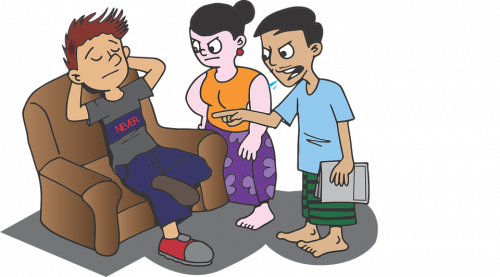
Bullying behaviors that pose a risk to one’s physical, mental, or social safety may involve acts of harassment, threats of exclusion, and physical or verbal assault. Bullies may have different motivations than others, but they still share certain traits in common. Some bullies do it due to the fact that they believe it will help them achieve their goals, whereas other individuals bully simply because they are incredibly unhappy, insecure, and have low self-esteem. Because of these factors, a question pops up for many people: “Is bullying a mental disorder?” Regardless, bullying is never appropriate, no matter what the reason or the setting.
Harassment (in-person or online harassment) and bullying are two different things. Any unwanted behavior that violates, degrades, or threatens a person is considered harassment. Even though it is sometimes a component of bullying, harassment can also occur between strangers or be a one-time dispute. It is not bullying if these behaviors are only displayed once. No matter how improper, actions involving disputes between equals do not qualify as bullying. Bullying cannot be defined solely by its actions.
Threats, negative remarks, and social exclusion are common tools used by bullies to damage and put off people. Such actions could be motivated by enthusiasm, a sense of helplessness, insecurity, or a craving for dominance. The repercussions on sufferers can be severe and even life-threatening, regardless of the cause.
Why Do People Bully?
There has been a tradition of unfortunate victims and individuals who experienced bullying then chose to act like bullies. Some factors lead somebody on whether to bully an individual and behave in such a harsh and persistent way when doing so. Undoubtedly, a decrease in in-person social engagement and a mental health condition has been linked to low empathic action.

Popularity
The lack of close parental involvement or supervision and the desire to gain popularity through bullying and other negative behaviors people think others in their social circle would find interesting are further contributing factors. Bullying may occasionally be a sign of one’s social standing. Popular individuals often foster relational hostility by teasing their less well-known peers. These popular people can additionally participate in slut-shaming, rumors, and social exclusion against others.
In the meantime, those who want attention may turn to bullying to move up the social ladder at school or work or acquire some social authority among other individuals. They may also intimidate others to lower someone else’s social standing.
Power
Bullying often occurs among those who crave power or authority. This is because they find getting power in social situations more alluring since they lack it in their individual lives. These people would rather deal with others only when it suits them. They turn to bullying if things and circumstances don’t go their way. To gain dominance, they frequently engage in relational aggression, sometimes known as a “mean girl” attitude.
When they hurt others, abusers feel strong and all-mighty. Any time, a bully can use different tormenting strategies to swiftly and easily inflict immense pain and agony on others without much thought given to the repercussions. They do not care as long as they think they are in control of the situation.
Pleasure
When bored and seeking amusement, some people occasionally turn to bullying to spice up their lives with chaos and excitement. Additionally, if their parents don’t provide enough attention or supervision, they may bully others non-stop. Bullying turns into a way for these people to obtain attention and cause power imbalance. It has been shown that how the brain processes pain varies in those with bullying problems and in neurotypical people.
In the meantime, individuals who lack remorse or empathy frequently take pleasure in hurting, offending, and humiliating the sentiments of others. They may find painful “jokes” humorous in addition to enjoying the feeling of power they obtain via tormenting others.
Peer Pressure
Bullying occurs when some individuals go against their self-interest in order to get along with a group. A lot of the time, these individuals are more anxious about being liked and blending in that they embrace bullying’s effects. Being a part of a structure that already exists typically requires these people to act or look a certain way.
Bullying can sometimes occur when someone just follows the pack, doesn’t complain about the action, and does not think differently. Bullying among peers might be caused by a person’s fear of rejection or of being the next person to be bullied.
Payback
After experiencing bullying, especially when they were children, certain people search for measures to get even or take vengeance. These individuals are frequently called “bully victims,” and because they have also experienced harassment and suffering, they frequently believe that their behavior is acceptable. They could feel vindicated and relieved after what they, especially as a child, went through when they hurt individuals they respect. These people occasionally pick on those who are weaker or perhaps more susceptible than them. They may even pursue the bully act in other instances where they pretend to be the victim while acting out as a bully.
While they may not physically harm others in some instances, some individuals with this bullying condition will exhibit a violent obsession. Emotional recovery may be delayed, and bad feelings may be retained. Pursuing vengeance can strain one’s social bonds and frequently result in a greater sense of loneliness and isolation. This is often the case when they experience negative things at a young age then bring this feeling of vengeance into adulthood.
Problems at Home
Since violence and aggressive behavior are modeled for them, people from abusive families are more prone to bullying. Individuals with irresponsible or absent parents may engage in bullying. They feel empowered and in charge, which they lack in their lives when they feel they cannot trust any parent. This may also be the case when witnessing bullying is just a daily thing at home. Furthermore, these people with poor self-worth may bully to mask their low self-esteem. Bullies often struggle to find their place at home and take out the emotional strain on others.
Bullying among siblings can also result in bullying at school or at work. A smaller sibling feels helpless when their elder brother or sister mocks and torments them. Or a high-ranking clerk bullies the lower-ranked ones. They bully others in an attempt to reclaim their occasional sense of authority, which they do not usually experience in any available settings.

According to certain studies, abusers who use bullying are a result of their issues with psychiatric conditions and psychological and emotional well-being. Some see the act as helpful since it allows them to deal with their lack of self-worth. They believe it is going to make them more acceptable to their friends. The power-hungry do it for their ego and harass other people.
Bullies occasionally have gloomy futures of their own, regardless of the causes. People who harass, intimidate, or humiliate others are more inclined to substance use and take drugs or alcohol excessively, get into arguments, commit crimes, quit or drop out of school, or harm their families or romantic partners.
According to the Centers for Disease Control, the effects of bullying on mental health are far-reaching. How does bullying affect mental health? Bullying can cause depression, anxiety and other mental health disorders.
The answers and remedies to every kind of bullying incidence must also be unique due to their distinct reasons. Regretfully, when it comes to bullying, there is no “one size fits all” solution.
However, some things can be done to help overcome bullying experiences.
Talking To A School Official: It is not a good idea to keep school administrators unaware of bullying incidents because they only occur on school property. It could be challenging to talk to another person at school, but when you do, you might appreciate the support system. Since schools have strong anti-bullying and cyberbullying rules, they have policies to deal with the toxic act.
Confide In Parents Or Trusted Friends: Talk to your parents, family members, or other trusted people about your bullying experience. Feeling supported will help you prevent you from feeling isolated. Spend some time discussing any issues you are having, both within and outside of school, over a meal with your loved ones. Talk openly and honestly about how you feel about the instances of bullying that you have encountered.
Report It On Social Media: Social media platforms have rigorous policies about the kinds of interactions and information sharing permitted in their system. By reporting the perpetrator to the website, you might get them blocked and cut off from communication. Bullying is still bullying that frequently violates and breaks the terms of service. Therefore, report incidents of cyberbullying to the administrators of the app or website when you experience one.
Ignore The Bully: The best way to act with a bully is to never engage with them; try as much as you can to avoid getting near them or causing any interaction with them. The more you show them that you do not want to be part of their antics, the more you’ll find ways to distance yourself from their toxic behaviors.
Seek Police Help: Every act of bullying varies in severity. Reporting bullying to the authorities in your neighborhood is another option if it involves any possible danger of physical harm. Long-lasting consequences may result from bullying, and repairing the harm done may require more than your supportive words and guidance if the abuse has been very severe.
In Conclusion
Keep in mind that it just takes a tiny step to escalate from harmless jokes to a full-fledged onslaught of bullying. The absence of in-person communication combined with the sense of authority that comes from the desire for power and popularity develops into a persistent campaign of intimidation, humiliation, and threats of physical violence. As was already indicated, the effect of bullying may cause long-lasting emotional distress or even result in suicide.
If you are experiencing it, do not hesitate to seek help.
































